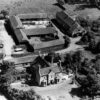
The Overseers of the Poor books for Muston have survived for the periods 1666-1729 and 1730—1789.
In 1661 An Acte for the Relief of the Poor was passed revising the existing Poor Laws to deal with support for the settled and ‘deserving’ poor. Under this act :
The Parish was responsible for poor relief.
The Overseers were to collect poor rates and allocate relief.
Work was to be provided for the able-bodied poor.
‘Houses of dwelling’ could be provided for the ‘impotent poor’.
Pauper children could be apprenticed.
Anyone applying for poor relief outside his/her native parish could be returned to it.
In 1662 a futher Act for the better Relief of the Poor of this Kingdom established:
Laws of Settlement and Removal
Allowed the local justices to remove anyone thought ‘likely to be chargeable’ to the parish to their ‘place of settlement.’
Required Parishes to issue ‘settlement certificates’.

Muston Church Cross ans Stocks 1968
Muston was a relatively small community and the circumstances of anyone claiming poor relief would have been known to the rest of the community. We know from the accounts which record maintenance costs that a poorhouse existed in Muston, but it is also clear that relief was paid to people in their own homes. It might include the cost of wool for spinning, or payment for work such as mending the highway. The early entries suggest that the attitude to the local aged and infirm was generally benevolent, Mary Thornton, aged 80, received a regular payment, while Anne Parnham, at 70, still able to spin or weave, got ‘apples when she was sicke’.
In April 1666, an eventful year, Master White and Will Marshall drew up the accounts of their expenditure as Overseers of the Poor for Muston.
The early C17th Overseers books for Muston are written in a version of ‘late secretary hand’ which is very different from later script. Spelling was not standardised. In addition, considerable knowledge of social history is needed to make sense of some of the entries which throw up all sorts of fascinating questions about the everyday life of a villager in Muston in the seventeenth century. For example, what might Anne Parnham’s pennyworth of grease have been for? Cooking, oiling a spinning wheel, lighting, waterproofing her shoes? What kind of grease would it have been? How much would she get for a penny?

Below is an attempt at a modern version of the first entry in the Muston book:

The Overseers support for Mary Thornton is financial, 21s 6d in total, while that for Ann Parnham ranges from clothing and shoes to small details like nails and the care of a sow. Cloth seems to have been an expensive item and the provision of heating in an area with very little woodland must have been a perenial problem. Before the building of the canal coal must have been brought in by carrier.
Possibly those who were given sums of money were capable of buying necessities for themselves, while Ann Parnham, who seems to have lived a long life, needed practical care. Payments for shoes and their mending for her recur and she can spin, so she does not seem to have been physically disabled. She was supported until her death 1688, when the parish bore the cost of her burial,1s6d, and her winding sheet, 4s6d. In addition to the payments to Mary Thornton there are thirteen other payments made to five women and nine men. Most are payments of 1s, but Alice and Susanna Parnham jointly got 2s, while Nath. Elston got 2s and Rich. Briggs 3s, Presumably they had dependents to support.
We do not know what proportion of the population of Muston these numbers represent, but it is clear from the support provided for Ann Parnham for many years that the Parish accepted its responsibilty to care for the settled poor. Those who did not qualify for settlement, however vulnerable, were a different matter.


In contrast with over twenty years of provision for Ann Parnham, under the terms of the 1662 Act, incomers or anyone with no settlement certificate who might be a burden on the poor rates was deemed to have no right to remain and would be ‘removed’. In 1691, Will Hickling’s girl, Katherine, born in Muston, was removed to Potter Hanworth, her father’s ‘place of settlement’. Her mother had died when she was born and her father had left her. She was 6 years old.









No Comments
Add a comment about this page